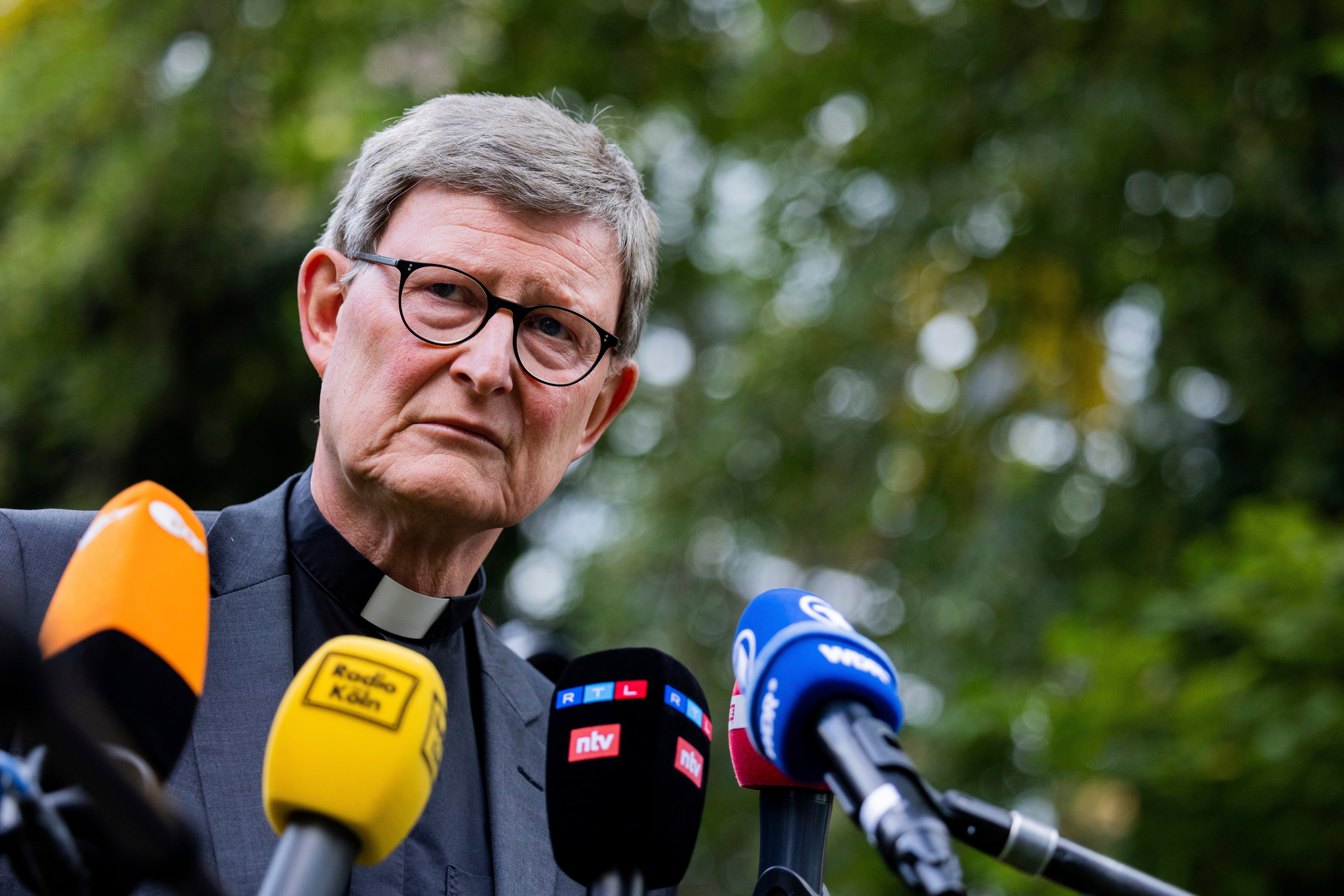Pope decides to retain Cardinal criticised over handling of sex abuse
The archbishop of Cologne, Cardinal Rainer Maria Woelki, will take a month-long ‘spiritual timeout’ before returning to his post in March 2022

Your support helps us to tell the story
From reproductive rights to climate change to Big Tech, The Independent is on the ground when the story is developing. Whether it's investigating the financials of Elon Musk's pro-Trump PAC or producing our latest documentary, 'The A Word', which shines a light on the American women fighting for reproductive rights, we know how important it is to parse out the facts from the messaging.
At such a critical moment in US history, we need reporters on the ground. Your donation allows us to keep sending journalists to speak to both sides of the story.
The Independent is trusted by Americans across the entire political spectrum. And unlike many other quality news outlets, we choose not to lock Americans out of our reporting and analysis with paywalls. We believe quality journalism should be available to everyone, paid for by those who can afford it.
Your support makes all the difference.Pope Francis has decided to retain a prominent German archbishop who was criticised over his handling of the church’s sexual abuse scandal, despite what the Vatican have deemed to be “major errors” of communication.
Cardinal Rainer Maria Woelki, the archbishop of Cologne will be reinstated in March, after a months-long “spiritual timeout”.
In a statement, the pope said that while he is counting on the Cardinal, “it is clear that the archbishop and the archdiocese need time for a pause, renewal and reconciliation”. The pope therefore granted the Cardinal’s request for a break. beginning in mid-October and lasting until March 2022.
The Cardinal has become a controversial figure in the German church, widely blamed for contributing to a “crisis of confidence” in the midst of a sexual abuse scandal.
Earlier this year, he commissioned an 800-page report that found 75 cases where eight high-ranking church officials failed to follow up on, report on, or sanction cases of alleged sex abuse by clergy and church employees; the report also found that in many incidents the officials failed to adequately care for the victims.
The report found that Hamburg archbishop Stefan Hesse, formerly a senior church official in Cologne, neglected his duty in 11 instances. As a result, he tendered his resignation earlier this year, but Pope Francis rejected his offer last week.
The report absolved the Cardinal of neglecting his legal duty to victims, but he later admitted to having made mistakes in the handling of past incidents of sexual abuse.
Cardinal Woelki kept an earlier report on how church officials reacted when priests were accused of sexual abuse under wraps, citing legal concerns, and infuriating many German Catholics. The second report was commissioned based on the church’s files and developed by a German law firm.
In June, the Vatican sent two papal envoys to Cologne to investigate the claims in the report and determine whether mistakes had been made in the handling of past sexual abuse cases. Based on their findings, the Vatican said the pope decided to reject the resignation offers made by two auxiliary bishops in Cologne.
The envoys also found no indication that Cardinal Woelki had acted illegally or attempted to cover any thing up by withholding the report on church officials’ reactions. They did, however, find the Cardinal responsible for “major errors, particularly at the communication level”. These errors “contributed significantly to a crisis of confidence in the archdiocese that is unsettling many of the faithful,” the Vatican said.
In response to the findings, Cardinal Woelki acknowledged his shortcomings in effective communication, and said: “I am sorry for that, I regret it”.
Reinhard Marx, the head of the German Bishop’s Conference, who previously criticized the Cardinal for his handling of the crisis, said that he hoped that a process of reconciliation could now begin in Cologne.
Limburg Bishop Georg Baetzing was less certain that the path the Vatican was pursuing was the correct one. In a statement, he said: “I can’t judge whether this can lead to a fundamentally different situation within a few months”. Any change would depend on how the Cardinal uses his “spiritual timeout” he added.
Others more fervently disagreed with the pope’s decision to allow Cardinal Woelki to return to his archdiocese following a brief absence. Thomas Sternberg, the head of the Central Committee of German Catholics, said the pope’s decision could not undo the harm the Cardinal had caused the church.
“The instrument of a timeout is not enough,” he said. “It is completely unclear what could stand at the end of such a timeout and it is not suited to restoring lost confidence.”
Auxiliary bishop Rolf Steinhauser will fill Cardinal Woelki’s role in his absence, running the archdiocese as an “apostolic administrator”.
Join our commenting forum
Join thought-provoking conversations, follow other Independent readers and see their replies
Comments